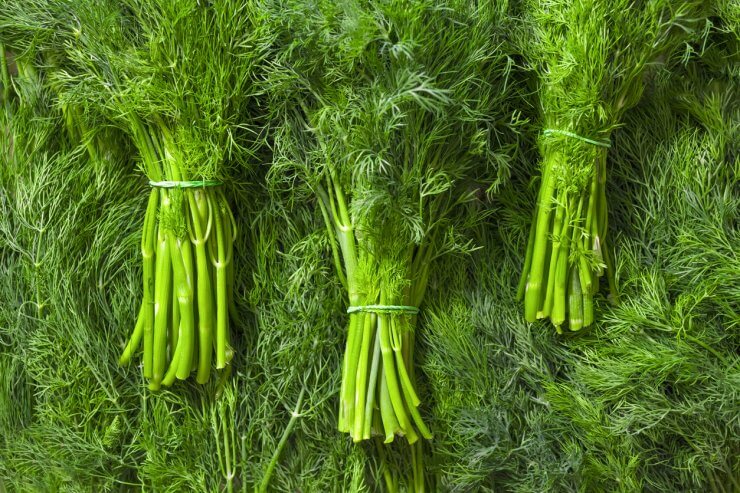
Dill bundles

Dill bundles
Dill may look light and airy, but it has some powerful health benefits. Rich in flavanols and plant compounds, dill can protect your heart, lower cholesterol, protect against cancer, and help control blood sugar. The vitamin C in dill helps boost your immune system and helps neutralize free radicals in your body. And your body can’t store vitamin C, so you need to be sure to get your daily requirement.
Here are some of the other ways dill contributes to good health—plus a couple notes of caution.
Heart health
Heart disease is the most common form of death worldwide. Consumption of plants with flavonoids, like those found in dill, have been shown to protect heart health due to their potent antioxidant and anti-inflammatory properties. Dill is also high in vitamin C which has been linked to reduced heart disease.
Vitamin C also contributes to lower incidences of stroke, especially among people who are overweight or have high blood pressure. However, people who drink or smoke heavily are less likely to enjoy the added benefits of vitamin C.
Keep in mind, however, that studies on dill and heart health have mostly involved dill supplements, not fresh dill.
Anemia Prevention
Anemia is iron deficiency. It’s most common in pre-menopausal women. Dill contains iron and vitamin C, both of which help prevent anemia.
Cancer Prevention
Studies have linked dill to a possible reduction in the risk of many types of cancer. Researchers think this may be due to plant compounds, like d-limonene, which are found in dill.
Type 2 Diabetes Prevention
In animal studies, dill has shown to have blood sugar lowering effects. This research has promising indications for helping to prevent insulin resistance, metabolic syndrome, and type 2 diabetes in humans.
Digestion
Dill—from the Norse word dilla, meaning “to soothe”—has been used for centuries to calm colicky babies, relieve flatulence, and treat digestive diseases. Although many people today still swear by dill’s positive effects on digestion, modern research has yet to find clinical proof.
Weight loss
Dill can have a diuretic effect, so drinking dill-laced water can help flush the system and may help people feel full sooner and resist cravings. Chewing on dill seeds is said to suppress the appetite and adding dill to low-calorie foods like fish and cucumbers can add a pleasant, slightly sweet flavor that can makes these foods taste more satisfying without adding calories.
Skin health
The vitamin C in dill may contribute to healthier skin—reducing the development of wrinkles and contributing to more hydrated skin and fewer blemishes.
Dill hazards
As you know, you can have too much of a good thing. While dill can do some great things for your health—help with the absorption of iron; fight inflammation; boost your immune system—it can also wreak havoc with other parts of your body, especially if you’re consuming dill in medicinal doses.
Allergy Alert
Some people are allergic to dill and other plants in the same family, such as carrots, parsley, fennel, asafetida, caraway, celery, and coriander. Contact will dill juice can also cause skin irritation.
Diuretic Effect
Dill can have diuretic effect, like a “water pill,” causing increased urination. Be sure to check with your doctor or pharmacist to see if eating dill more than occasionally might interfere with the medications you take.
Underactive Thyroid
When taken in medicinal doses, dill can lower thyroid hormone levels. If you have an underactive thyroid, medicinal dill can have a negative effect on your thyroid health. Eating dill as food is usually not a problem.
Pregnancy
Dill supplements can have adverse effects on pregnant women, including starting menstruation. Be sure to consult your doctor before taking dill supplements if you are pregnant or planning to become pregnant.
Did you know that dill is so healthful? Did you know about the potential pitfalls of consuming dill? Please tell us how you use dill.




I’ve just started putting dill the herb,Into my smoothie every morning, I’m not on any medication, how much would you advise i put in,would it help with my cholesterol levels.